The Clockmaker's Gambit
In April 1775, the American colonies had burst into open rebellion against King George III. In the glittering salons of Paris, whispersof liberty mingled with the clink of wine glasses as the nobility watched thewar in America unfold from afar. Some volunteered to join the fight, defyingtheir King Louis XVI's wishes. Most simply read the bulletins andbroadsheets, whispering their support.
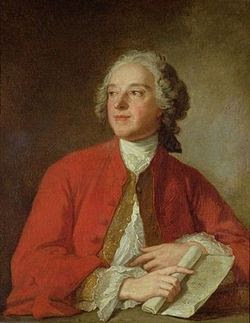 Beaumarchais: Clcomaker, Playwright & Spy
Beaumarchais: Clcomaker, Playwright & SpyBut a commoner, a clockmaker and part-time playwright, wasweaving a web that would stretch across the Atlantic and help give birth to anation. Pierre Augustin Caron de Beaumarchais, a watchmaker turned playwright,was about to help elevate the most significant rebellion of the century.
The ClockmakerBorn in 1732 to a Parisian clockmaker, young Pierre Caronwas no stranger to tinkering. His skillful fingers crafted timepieces so finethey caught the eye of King Louis XV’s court. By his twenties, he had charmedhis way into Versailles, teaching harp to the royal daughters and earning thenoble suffix “de Beaumarchais” through a clever marriage and a talent forreinvention. His skills brought him close to young Louis XVI, an amateur clockmaker.
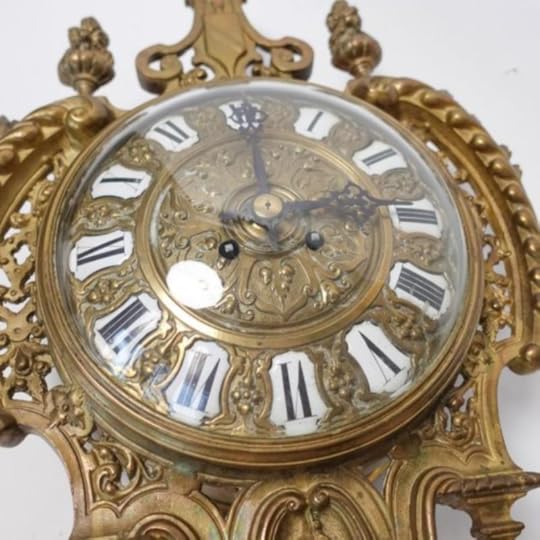 18th-century Century Clocks were High Tech Gadgets of the Age
18th-century Century Clocks were High Tech Gadgets of the AgeThe Playwright
But clocks and courtly manners were just the beginning.Beaumarchais had a restless mind, thriving on the stage and in the shadows. His plays, like The Barber of Seville and The Marriage of Figaro, delivered sharp jabs at the aristocracy, earning him both applause and enemies. His plays drew the King's ire and were banned, but later revived as operas by Mozart. By the 1770s, he wore manymasks: dramatist, merchant, and secret agent for the French crown.
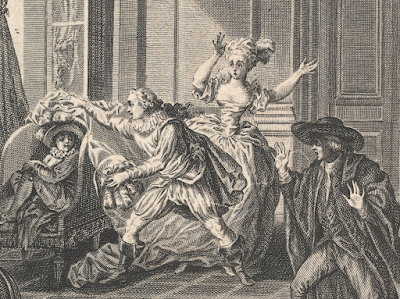 Scene from Marriage of Figaro
Scene from Marriage of FigaroA Complex Script
But it was in a different kind of play where Beaumarchaistruly found his calling. France, still sore from its defeat in the Seven Years’War, saw a chance to poke Britain in the eye by aiding the American rebels. ButLouis XVI, cautious of open war, needed plausible deniability. Beaumarchais's flairfor drama made him the perfect man to orchestrate a covert operation.
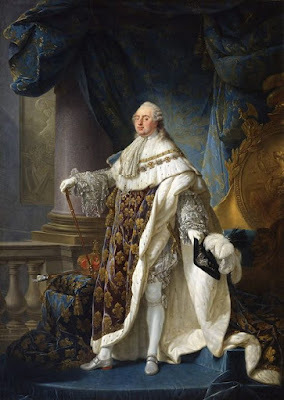 King Louis XVI
King Louis XVIIn 1775,he met with American agents in London, including Arthur Lee, a Virginia lawyerwith a fiery patriot’s spirit. Lee’s stories of colonial resolve ignited aspark in Beaumarchais. Here was a cause that blended profit with principle—achance to arm the rebels, weaken Britain, and help rearm France.
The PitchmanBeaumarchais pitched his plan to Foreign Minister Comte de Vergenneswith the enthusiasm of a man promoting a hit play. “Sire, the Americans needmuskets, powder, and cannon,” he argued. “Let me supply them through a front—atrading company. France stays clean, Britain is caught off guard, and libertywins.” Vergennes, no fool, saw the merit.
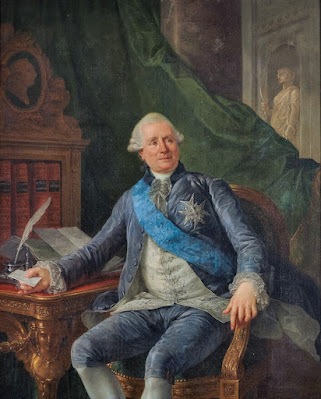 Comte de Vergennes
Comte de Vergennes
By 1776, Beaumarchais had createdRoderigue Hortalez & Compagnie, a front (a sort of shell) company thatacted as both merchant house and espionage hub. With a million Livres from theFrench treasury (and another from Spain, persuaded by Beaumarchais’ silvertongue), our playwright got to work.
Secret ScriptImagine a busy office in Paris, clerks scribbling invoices,while in the back room, Beaumarchais haggles with arms dealers and dodgesBritish spies. The operation was a dangerous game. Britain’s spies prowled thedocks, looking for French interference.
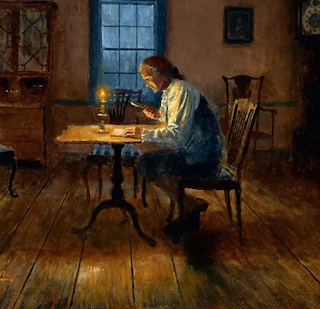 Back-room Scheming and Planning
Back-room Scheming and Planning
Beaumarchais wrote coded letters, usedaliases like “Durand,” and spun stories to mislead the enemy. One moment, hewas a merchant shipping “cloth” to the West Indies; the next, he was smugglingmuskets to American privateers. His ships, loaded with 200 cannons, 25,000muskets, and tons of gunpowder, sailed under neutral flags to ports likeSaint-Domingue, where American agents waited.
Stormy Reviews
But the sea was no friend to Beaumarchais. Storms, Britishpatrols, and shoddy captains sank half his cargoes. Worse, the Americans wereslow to pay. Congress, short on cash, sent promissory notes and tobacco insteadof money.
Stormy Seas, Secret Cargoes
Beaumarchais was under pressure but kept going, driven by a mix ofideals and ambition. His supplies arrived at critical moments for GeneralWashington’s army. At Saratoga in 1777, American troops, armed with Frenchmuskets, crushed General Burgoyne’s redcoats—a victory that convinced France tojoin the war openly. Beaumarchais’ guns had tipped the scales.
The Clock StrikesDespite his successes, Beaumarchais’ life was a riskybalancing act. His enemies at court, jealous of his influence, whisperedaccusations of treason. His debts piled up as Congress delayed payments. In1777, he faced brief exile after a duel gone wrong but bounced back, ever thesurvivor. His plays kept him in the public eye, their sharp wit echoing his owndefiance. The Marriage of Figaro, banned for its cheek, was a jab at theold order—a nod, perhaps, to the American rebels he admired.
Resetting the ClockBy 1778, France’s formal alliancewith America changed Beaumarchais’s role. His secret trading gave way toofficial French aid. But he kept scheming, running spy operations forVergennes, uncovering British plans, and even outfitted ships for privateeringto harass British trade. Theseactivities were less about traditional espionage and more about logisticalcoordination to disrupt British supply lines. For instance, Beaumarchais usedhis network to monitor British merchant vessels, enabling privateers to targetthem effectively, which indirectly supported the Allied war effort.
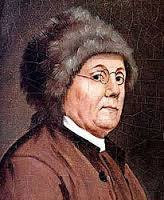 Doctor Franklin
Doctor Franklin
His Paris home became a hub forAmerican envoys like Silas Deane and Benjamin Franklin, who valued his charmand connections. Franklin, in his fur cap and with a sly grin, calledBeaumarchais “a genius in his way,” though he joked about Beaumarchais’ endlessrequests for repayment.
Winding DownBy 1779, his focus increasinglyshifted to settling financial disputes with the Continental Congress overunpaid debts for earlier covert aid, decreasing his role inintelligence-gathering. The war’s end in 1783 didn’t bring peace forBeaumarchais. Congress owed millions, but American funds were limited. He spentyears chasing debts, with his wealth shrinking.
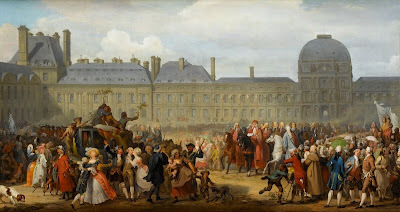 Peace celebrated in Paris
Peace celebrated in Paris
When the French Revolution brokeout in 1789, Beaumarchais supported its ideals but recoiled at its violence.Accused of hoarding arms, he fled to Germany, returning only afterRobespierre’s fall. He died in 1799, his life a whirlwind of victories and setbacks.
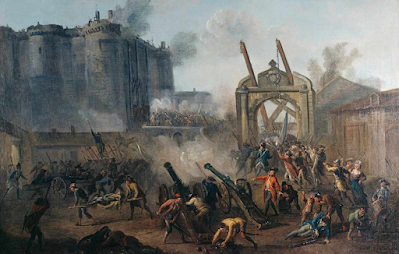
Storming the Bastille Launched the Revolution
Curtain Call
Beaumarchais saw America’s fightas a reflection of his own struggles against privilege and authority. His playsmocked the nobility; his guns supported the rebels. He was a man full ofcontradictions—a courtier who despised tyranny, a profiteer risking everythingfor a cause.




